1244 Golden City to Tobacco Plains
ORMSBY REVIEW PRESS: Frederick Paget Norbury, Chapter Three: Letters, 1887
by Brenda Callaghan
*
Editor’s note: we are pleased to present Chapter 3 of Brenda Callaghan’s hitherto unpublished biography, Frederick Paget Norbury, Remittance Man or Gentleman Immigrant? The Story of an Englishman in Canada. Earlier in 2021 we published the Introduction, Chapter 1, and Chapter 2.
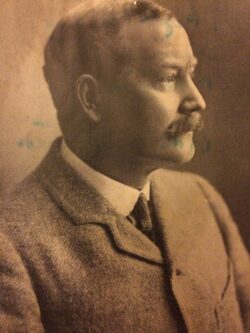
In 1887, Tommy (Frederick Paget) Norbury, who grew up on and eventually inherited an estate in England, became one of the first immigrants to travel west to British Columbia on the newly-completed Canadian Pacific Railway. Norbury (1867-1940) would work in the East Kootenay as rancher, Justice of the Peace, Stipendiary Magistrate, and Special Constable.
In 1898, Norbury returned to Sherridge House, near the village of Leigh Sinton, near Malvern, Worcestershire, having spent a productive and fruitful 11 years in BC.
Sadly, Brenda Callaghan died in 2o18 before she could see the book published in The Ormsby Review Press. (Please see her biography at the foot of this post). Callaghan’s full 135,000-word manuscript of Frederick Paget Norbury, “Remittance Man” or Gentleman Immigrant? The Story of an Englishman in Canada, will be published in The Ormsby Review over the coming months, and simultaneously in The Ormsby Review Press.
We thank Brenda’s husband, Tim Gould, and her daughter, Natasha Schorb, for the opportunity to publish Frederick Paget Norbury online here. — Richard Mackie
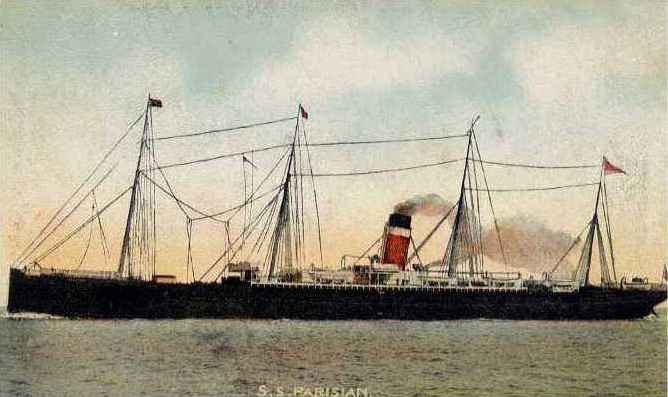
*
Moville,
N. Ireland,
Parisian
August 12, 87
My dear Dad,
We are now at anchor off Moville, having arrived here about 6:00 this morning and we stay here until 3:00 this afternoon for the mails. I have had a most pleasant journey so far and have not felt in the least ill. There was a stormy wind blowing last night but the sea was not at all rough — the ship did not roll at all.
I have got a capital cabin with Greathed. I slept like a top. I bagged the bottom berth of the two as I did not like the idea of falling from the top one. I got a telegram from mother about the key. I rather wish she had sent it to Brydges, as he lives in Winnipeg and there would not be much chance of its being lost, but I hope I may get it all right. I also found a letter from Mr. Sheppard wishing me goodbye. There are about 150 saloon passengers and they are a rum lot of chaps, mostly dirty and unpleasant. One thing there is a splendid bath filled with sea-water, into which I hope some of them will venture.
With love for all,
Your loving son,
Tommy
*
Parisian,
August 16, 87.
My Dearest Mother,
As time goes rather slowly on board, I may as well begin a bit of a letter to you, although there is really very little of interest to tell you. A whale or a ship about five miles off is a tremendous excitement. We left Moville about 4 o’clock on Friday afternoon and had rather a nasty sea that night, which had the effect of making most of the passengers heave vastly, including myself, but I was nearly all right the next morning barring a bit of a headache, and am now very fit again. With the exception of that one night we have had nothing to grumble about. It has been rather cold and very little sun, but I have enjoyed myself very well so far. It was very stupid of me to have left that key. I wouldn’t mind betting it is on this vessel, having come on board with the mails at Moville. A good many people came on board at Moville from London and elsewhere, which saved them spending about nine hours in England longer.
We have rather an amusing sort of lottery about the distance the ship moves in a day. Tickets are sold at four each, and you draw a number between about 300 — 360, which is somewhat about the number of knots the ship goes in a day. An auction is then held of the tickets. We have a young chap who makes a splendid auctioneer. The best tickets, viz. about 340, make as much as 32/-, the highest price at present, but the prices go up each day. Then half the price of the ticket goes to the owner and and the rest to the pool. The pool today was worth £15. We ran 189 knots in the first day, 289 on the second, 340 on the third, 355 on the fourth, and 339 on the fifth. We saw a whale and a ship yesterday. Not a very large whale. Dr. Bernardo [Barnardo], who is on board with 157 boys, gave a lecture last night and I thought it very interesting. There was also a dance on the deck and more of Dr Bernardo’s boys gave a concert — tonight there is going to be a discussion. …illegible…
Friday.

We are just going to meet the Sardinian which will take this home – am quite well and have had a very enjoyable journey. Am going to Niagara with Barneby. Will write from Montreal, where we expect to arrive Sun.
Barneby and I have decided not to telegraph in to find out about the steamer, as I have no chance of letting Phillipps know my change in plans and it might end in missing him altogether, and as I shall have to wait five days somewhere, I thought it best to stop this end, not at Golden city, so I decided to join Barneby and the others and go and see Niagara and the Thousand Isles. The expense of stopping five days would be the same anywhere and the only additional expense is the railway journey from Toronto to Winnipeg. We shall all go together as far as there and it is only two days rail from there to Golden City. Among the distinguished company on board are Sir W Des Viceux, Gov. of Hong Kong, Lord Archibald Douglas, Marquis de Blacas, Hon. C. Baring and Col. Baring, and The Canadian Rifle xviii from Wimbledon. The concert was a great success. £15 was taken for the sailors’ orphanage at Liverpool and £6 collected on Sunday for the same thing.…illegible….
Montreal.
We have arrived here at last, having got here about 5 o’clock pm. on Sunday. We were delayed two days altogether by fogs, and for twelve hours in the St. Lawrence by a sand bar, which can only be crossed by big vessels at high tide. There is some change in our plans, as Mr Brydges, whom we expected to meet here, has gone to New York, and does not return until Tuesday evening. So we cannot leave till Wednesday morning. This is a most splendid hotel, and we were all very glad to get here, as the tinned meats were getting rather monotonous. Of course we were very well fed on board, but whatever you ordered it always tasted the same. We went down the Lachine Rapids this morning which was great fun. They manoeuvre in and out of the rocks in the most marvellous way. They go about thirty miles an hour down there. They change the bank notes alright here, but only give $4.86 cents for gold and not so much for notes. The journey from here to Golden is £13, and living here is £4 10s. per day, so I shall very likely have to borrow a pound or two off Barneby. I will write and tell you if I have to. I hope you will be able to read most of this, but writing on board was not an easy matter.
With best love to all,
From your loving son,
Tommy

*
Montreal,
August 24, 87.
My dear Col. Norbury,
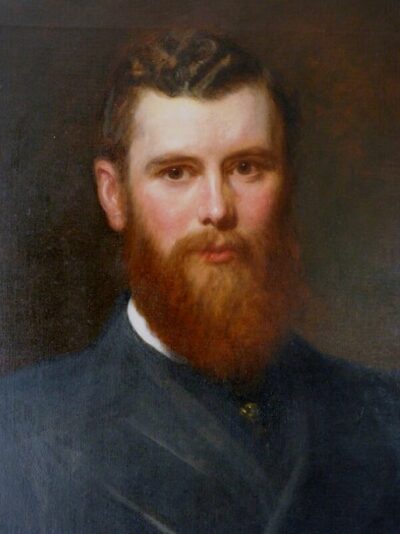
I send you some lines to say your son is getting on first rate — and appears very happy, and hope when you hear from him he will be able to give a good account of himself. We had a long discussion about his plans, and whether to reach Golden City before the 5th September or not, but when he showed me Mr. Phillipps’s letter acknowledging his saying the date for leaving Winnipeg would be August 31st, and the date for reaching Golden City would be September 5th, and Mr. Phillipps saying he would meet him at Golden City, I fully agreed there would be a great risk of the two not meeting unless these dates were kept to, and that it would be unwise of your son to run any risk of getting astray between Golden City and Tobacco Plains. We are prevented from arriving at Winnipeg before August 30th, as Mr. Brydges will not be ready to receive us before that date: so we are going to make a little detour by Niagara, and Rank says he is sure you will not mind his accompanying us so that I may see him safe through to Winnipeg. I hope you will have no objections to this and I have endeavoured throughout to act for your son, as far as I can, in what I think to be in accordance with your wishes. With kind regards to Mrs. Norbury.
Yours sincerely,
W.H. Barneby
*

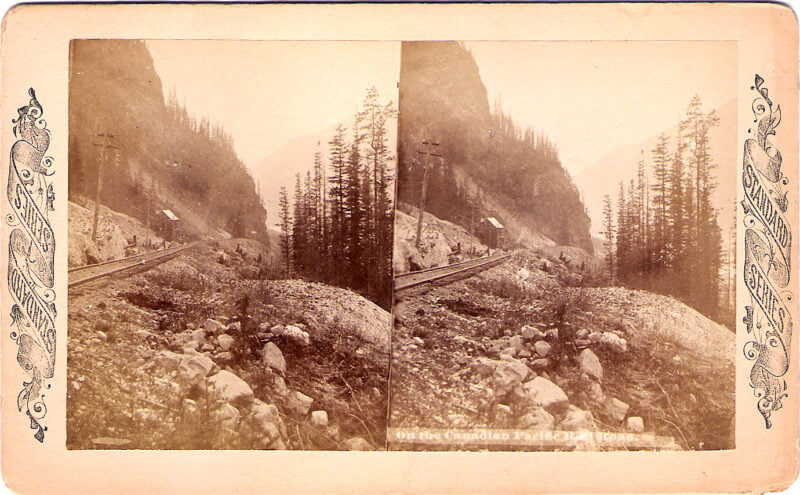
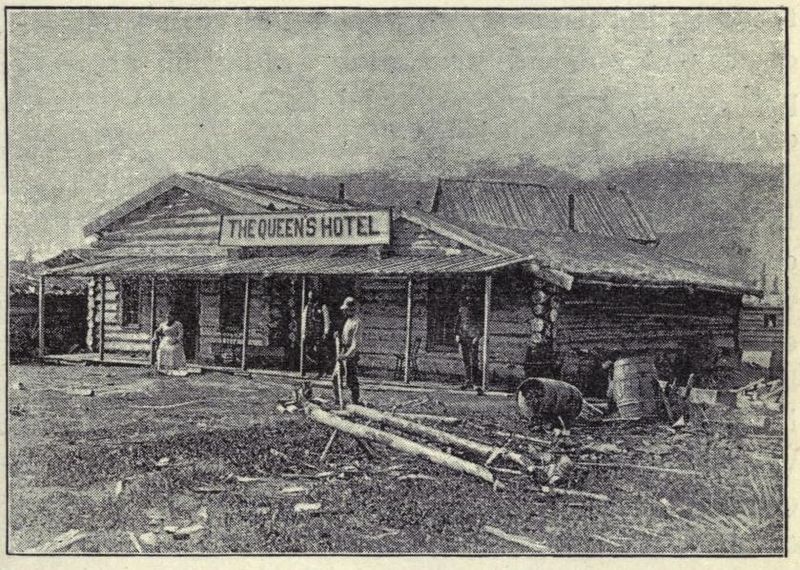
Queen’s Hotel,
(consisting of a corral and a log hut) Sept 4, 1887.
My dearest Florence,
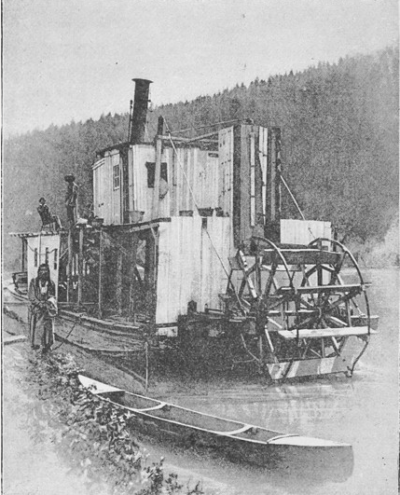
I shall always write to you all in turns, so that you will know if any are lost on the way. I have got this far all right without losing anything. I got here yesterday morn, about 11:30 am. I put am. but there is no such thing here. They go on till 24 o’clock and when they tell you that the time is half past 18 o’clock, it takes a little reckoning at first to find out what time that is. This city consists of about fifteen log huts, not very large in size, but they consume more firewater and [produce more] filth than an English town of 1000 inhabitants. It is a lovely situation, just in a small valley between the Selkirks and the Rockies and where the Kicking Horse River joins the Columbia. I have to stay here till tomorrow evening, having just missed the steamer. It left the evening before I got here. It seems most extraordinary that no one in Winnipeg or anywhere else knew anything about it. I wanted to telegraph on to the Station Master to ask if it was running, but Mr Brydges said he knew a man who knew all about it and would ask him. This chap informed him that the steamer was not running as the water was too low. The steamer, as a matter of fact, has run regularly since May, except once when she went down for a day, but they got her up again, and she is going to run to the end of this month as the water is eighteen inches higher this year than ordinary years. So I expect to see Mr Barneby down in Kootenay some time, as he said he would come down if the steamer was still going.
My shingles are nearly well now, but these mosquitoes are nearly as bad. I tried a bit of fishing yesterday, but they won’t take a fly here, although they will further up. Two fellows caught a few bottom fish but not of much account. I left Barneby and the rest at a station sixty miles this side of Winnipeg. They were going off, Brydges and him, for a fortnight shooting. I never saw anything like the numbers of wild duck and geese coming along this line — anyone can shoot them. There are no game laws in this country. You can go and shoot just where you like, in another man’s garden or anywhere.
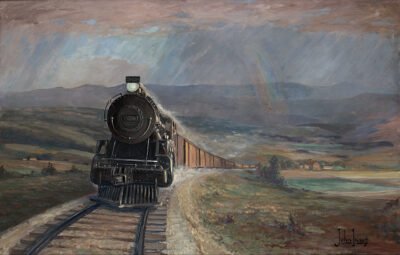
The railway line along the Kicking Horse Canyon is wonderful. It keeps quite close to the river all the way, and sometimes you have great rocks hanging right over the line. Then those awful wooden trestle bridges! There will be an accident sometime shortly. They creak and squeak all the time the train is on them. Some of them are 250 feet high — there is one 390 feet. Then the curves they go around! Upon my word, I thought at one time the engine was going round to push at the back of the train! I travelled with a Parisian (name of the ship we went out in) friend from here – a Vet, Hiley — a very good sort. From where I left Barneby, I travelled as far as Calgary with a chap who used to learn farming with Purse of Cradely. Lord and Lady Herschell were in the train. I am afraid there is not much in this letter, but news is rather scarce. I suppose the Squire is having good times with the birds.
Your loving Bother,
T.
*
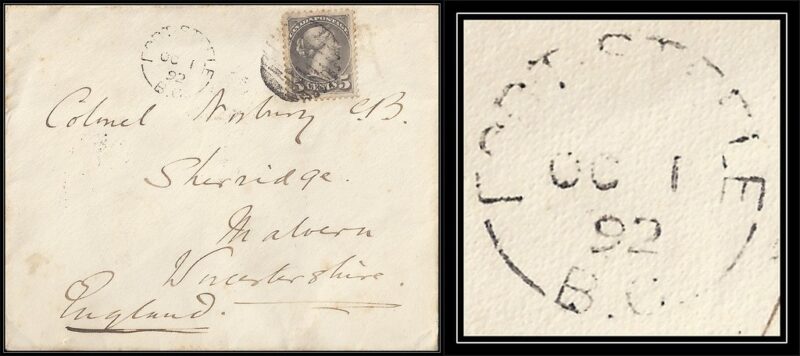
Manitoba Club.
Winnipeg. Sept 14, 87.
My dear Colonel Norbury,
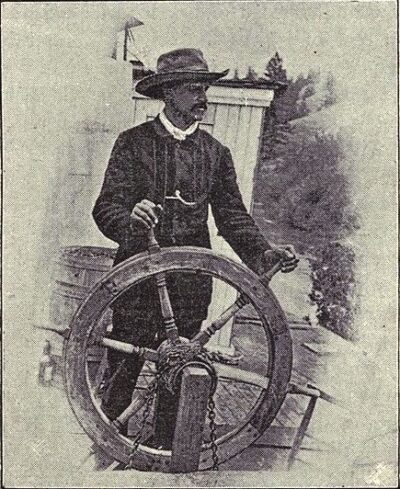
I am just back here from a six hundred mile trip up North, but I returned so as to have an interview with Colonel Baker about the possibility of my getting to Kootenay and thence North. If you have not heard from your son since his arrival, you will be glad to know that Colonel Baker met him, just landing by the steam boats by the Columbia, when your son gave him a letter from me, which I had asked him to deliver on the chance of their meeting. He and Mr. Phillipps had made arrangements for your son to be met at that point and all was in readiness for his advance.
Colonel Baker told me that Mr Phillipps was a capital man in himself, well acquainted with the country, with a good holding, a man who would show a young fellow how to work; but he said there was one and a very great objection, which I think I ought to mention to you (and I hope you will not think I am intruding in your affairs, but Colonel Baker said your son did not know it, so assume you do not either). Mr Phillipps is married to an Indian Squaw, and has a family by her. Colonel Baker said the oldest girl is nineteen years old, and that none of the family except the father could talk a word of English. I fear this will not be very comfortable for your son. He is such a good fellow I am sure he will make the best of it, but at the same time I do not think it is quite what he expected. He will, however, probably write and tell you how he gets on. I asked Colonel Baker again to do all he could to help your son should he require any assistance or advice, and I am sure he could not go to a better man if he requires any of either.
With very kind regards,
Yours sincerely,
W. Henry Barneby
*
Tobacco Plains,
Kootenay,
Oct 5, 87.
My dearest Winifred,
I have arrived here at last. We left Wild Horse Creek on Saturday, Oct 1st, about 1pm. and travelled about twenty-two miles that afternoon, camping out on the banks of the Kootenay River. Next morning we made an early start about 7 am, having to cook and eat breakfast, catch and saddle with the packs (which takes a long time) the horses all beforehand. We had to do the long side of a good forty miles that day and got in here about 5:00 pm. Sixty-five miles, for it is quite that, with two pack horses in a day and a half is good work, and I was very glad to dismount at the end of it. I did not get at all sore behind but get so frightfully stiff sitting in the same position for such a long time. My knickers-breeches and “Eklesia” are indeed boons.
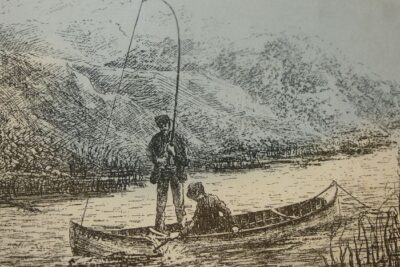
The Tobacco Plains are far ahead of any part of B. Columbia I saw, and where this place stands it is most lovely, just underneath the Rockies on the east, which swarm with deer, wild sheep and goats and plenty of bears a little way off. It stands at the head of a long valley stretching south for about eight or nine miles, with another range of mountains at the end. On the west, on the top of a small hill are the plains, which stretch as far as the Kootenay River, eight miles off. There are any amount of prairie chicken and willow grouse on the plains, and duck and geese. On the north the valley gets much narrower — about one mile wide — with a stream containing some nice fish and two lakes, also a lovely waterfall about one hundred feet high. There are two gardens: the one about forty-two acres and another twelve, which grow the best potatoes I ever saw, also swedes. carrots, peas, oats, beetroot, cauliflower, cabbage and any sort of vegetable; and the ranching land is the finest in the Kootenay District. So what can a man want for more? The forty-ninth parallel Lat. runs half a mile south of here, which is supposed to be a dividing line.
Your Loving brother,
Tommy
P.S. Never mind about the collars if not already sent. Have given them up — no irons or starch. If ever you send anything, send separate from a letter if ever I need anything. I don’t want everybody to read it as they always open it.
*
All of the following partial letters appear to have been written from the Phillipps ranch and contain Tommy’s first impressions and sketches. — Brenda Callaghan
…being so close to the boundary line but I don’t think it makes much difference. ‘Here’ consists of: the original house in which Phillipps lives, and a nice new house for visitors in which I live.
… You see I have my bath close at hand but the water will not bear being sat in long, being always icy cold.
… We have been hard at work digging potatoes. Phillipps has got a contract to supply the police with 14000 lbs. I worked very well but am in very bad condition. My hands have got soft from doing nothing and my wind is dreadfully short. There was a fellow staying here last night, Fenwick from Hampshire, a sort of cousin to the Chelts he thinks. He is not a bad sort but is by far the biggest liar I ever came across. Henry Little isn’t anywhere near it. Phillipps is off back again to Wild Horse for about a fortnight. So I shall be by myself for a bit. But there are plenty of potatoes and prairie chickens to amuse myself with. But this potato digging and the temperance system don’t go a bit well together. I shall have to send this tomorrow by Phillipps as I shan’t have another opportunity of sending it, although it won’t leave Wild Horse until 15th October when the next mail comes.
… We have to head up to Wild Horse for the mail. Sixty five miles as I said before. So you won’t get another letter for some time. When P. comes back we are going to have a good time hunting deer and bears in the mountains. I like the country and place much better than I ever expected to do so far, and I have spotted a nice place six miles north of here which I hope some day to occupy. Get Coni to write and tell me all about the partridge shooting. You might take in turns writing. Mother has done it all at present. I think I thanked her very much in my last.
Best love to all,
Loving son,
Tommy
*
Cranbrook,
Kootenay,
Oct 30, 87.
My dearest Betty,
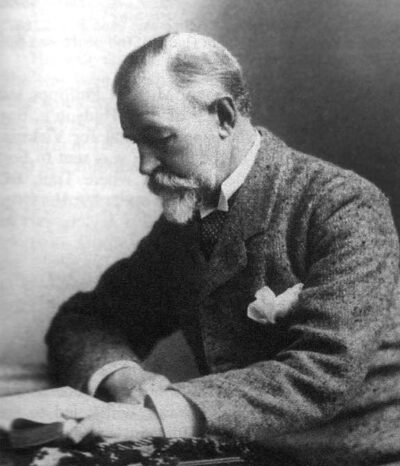
You observe I have made my way back here again, having come up from Tobacco Plains for the mails and chiefly in the hope of meeting Barneby; but I am disappointed. He met Colonel Baker in Victoria and arranged to come here next spring about May. Young Baker had written to him to say he would go all the way to Golden (160 miles) to meet and take him to the Northern Pacific (150 miles) but I suppose he did not like to alter his arrangements with Col. Baker, and if I don’t hear from him I shall be in rather a hole, as I do not know where to write to him.
We took three days coming up from Tobacco Plains as we (P., self, and boy) were packing up vegetables. It was very cold two nights, as low as 2 degrees above zero but we were most comfortable. Phillipps brought an Indian lodge, which is a little bigger than an ordinary Bell tent and is put up with twelve poles inside. In the middle of the tent you have your fire in which you can do all the cooking without getting out into the cold, and it is not the least smokey inside. The draft of the chimney is regulated by the projecting ears outside, which you can move with the two poles outside, and are always kept facing in the opposite direction of the wind. Before you go to bed you arrange some chips and wood underneath your blanket, and without getting out of bed you can light the fire so that by the time you get up there is a good fire going. P’s time of getting up is 5:00 am so that breakfast is cooked and eaten and the washing up done before it is light.
We expect the mail in this evening, and if it comes in then we start tomorrow morning back for T. P. We shall go back in two days, the horses having no packs. I came here on Friday. The distance from here to T.P. is about 82 miles. I send you some sketches from which you may perhaps understand the cattle in the picture are the same size as the horses, but that is the result of the wonderful bunchgrass.
I got the lines and casts. Please thank Dick very much for them. I had quite forgotten I had not thanked mother for the last two letters, Sept 14th and 21st, or Dad for the two Berrows and two Pinkuns which were most acceptable. Katie and Libbie was the name of the photographers from whom I bought the photo at Niagara. It sounds rather “Tottle and Dollish” but I don’t suppose the young ladies take the photos.
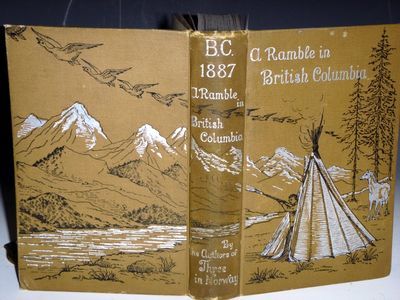
The canoeists, Lees from Manchester, and Clutterbuck from Wiltshire, are here and we have just had our photos taken as a group. I am getting on first-rate with the Kootenay language. I am writing to Mr. Grasset this week so you must not expect much of a letter and really there is not much news. Baker is coming down to Phillipps for some hunting (i.e. shooting) in the winter. It is a great place for deer. I went out one day but only had a shot at a Kiote (Spelt Coyote in Woods Nat Hist) but missed him. I will finish this when I have got the mail. The Grassets might like to see my sketch of T. P. I have made the valley look too narrow in No. 1. It is about half a mile wide and the mountain juts much too near. That funny table land hill is about three miles away.
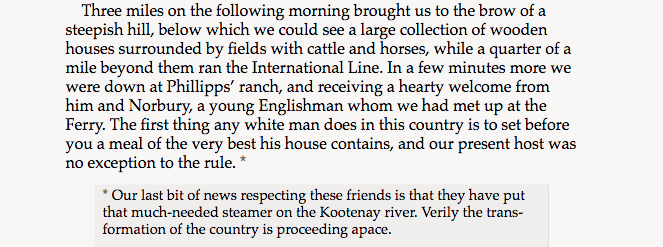
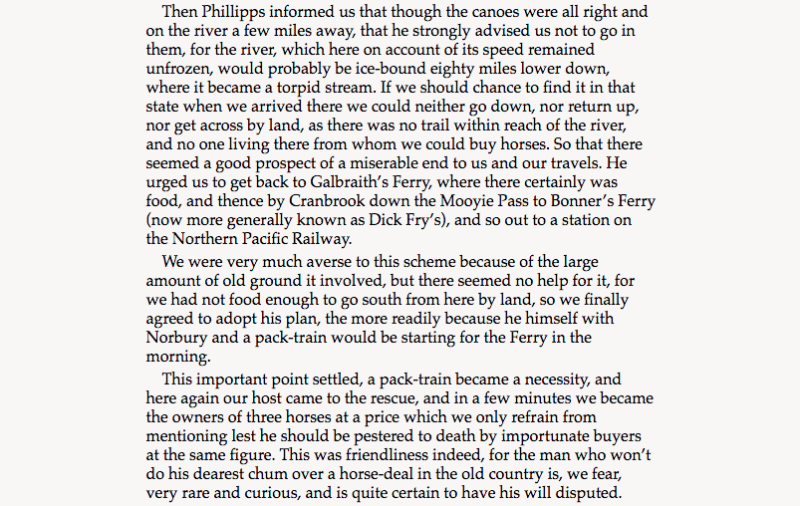
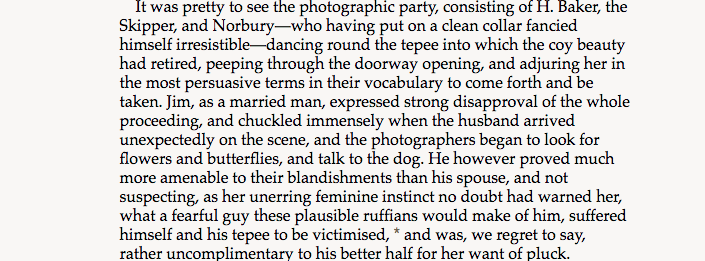
Oct 31. I got mother’s two letters, Sept 23rd, Oct 5th, one Berrows and two Pinkuns. They are most acceptable. I intended not to tell you about the Mrs. and family, but as you have found out I will write and tell you all about it in my next. I have not time now, more than to tell you that I am rather pleased than otherwise. But you see the reason why P. is not well off, and does not require any help. Do not tell anybody about it.
Loving brother,
Tommy
[PS] I have three and a half dollars to live on but will make out some how. This will leave Kootenay on Dec 1st.
*
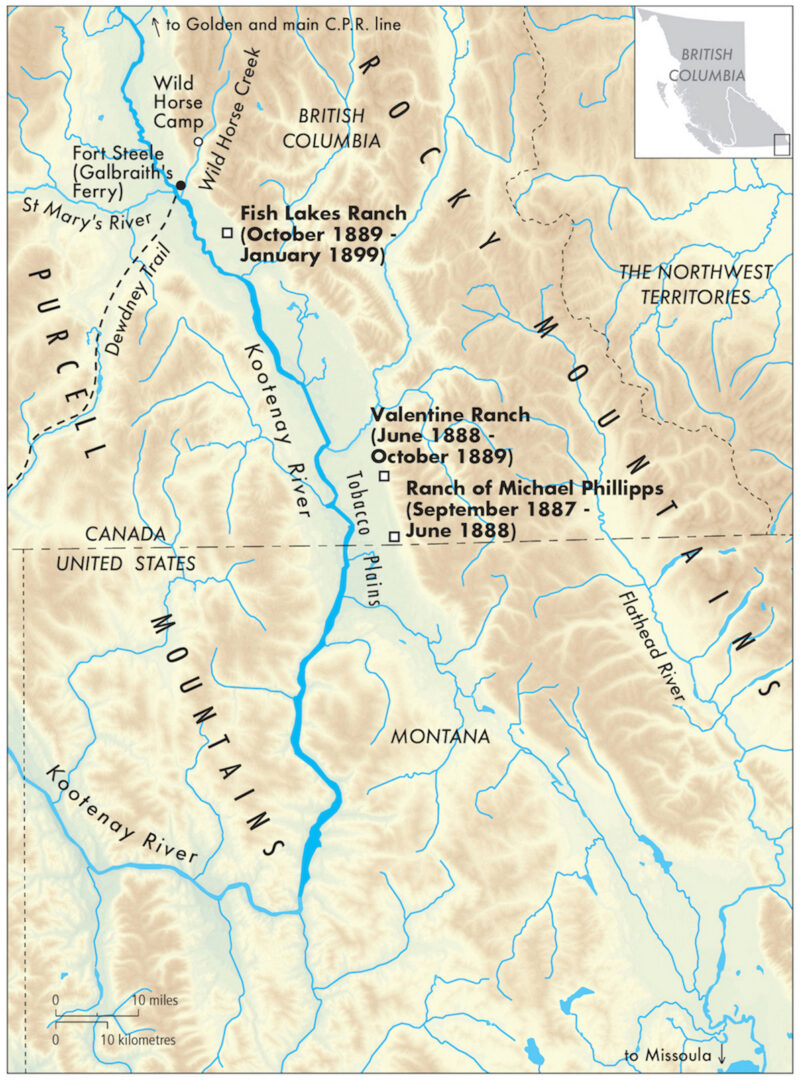
Tobacco Plains,
Kootenay, B.C. Sun Nov 13, 87.
My dear Dad,
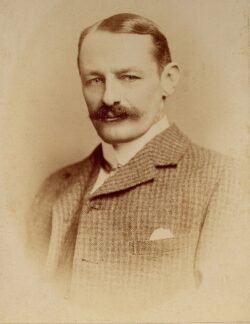
As perhaps it will be spring before I get an answer to this, I will tell you what my intended plans are for next year. The ranch which I told you about seven miles north of here, Phillipps has already taken up for his oldest son, but he does not seem to care about living there by himself, so P. says it is perfectly open to me to take it if I like. It is a very nice place indeed, very much like this, below the Rockies, but rather more enclosed in trees on the north, the south being open to the Plains on the west. It is off the trail which is a great advantage, as one is not everlastingly bothered with people wanting a night’s lodging, and is the reason why no one has grabbed it before, P. being about the only man who knew of it. P. has already staked it off, which means he has marked out with a stake at each corner 320 acres, i.e. one mile by half a mile. You can take 160 acres if you like but in this instance it is much better to take 320, as the ranch is about 400, and if I only took 160 someone else might slip in and take the rest, which would never do. The cattle and horses would likely always get mixed and perhaps he might be a disagreeable neighbour, and if I took the 320 I should get the remaining eighty for nothing, as you cannot take less than 160.The pre-emption price is one dollar per acre, payable by instalments of one quarter of a dollar an acre a year. (i.e. if you had 320 acres, eighty dollars a year for four years and then the property becomes your own.) To record which is done by filling in a printed form saying you have taken up the land and that you are a British subject and a few other things, then you pay two dollars. All recording is stopped until 1st January next year on account of Baillie-Grohman’s business. After which date I shall record as soon as possible and my first instalment of eighty dollars shall be due anytime in that year. I have already engaged one of the very few honest and sober men in the country to put me up a cabin. He is the same man who was sent to meet me at the Steamboat Landing: John Campbell by name. He will put it up for about sixty dollars; and now I had better make a complete list of what things I shall want and their cost. Divide dollars by five to get pounds sterling.
Putting up cabin $60
Plough $30
Harness $30
2 work horses $130
Riding horse $60
Saddle and bridle $35
2 axes, spade, scythe, saw, hammer, chisel, auger $25
Cooking and eating utensils $15
Dutch oven $5
Sundries $20
[Total] $410
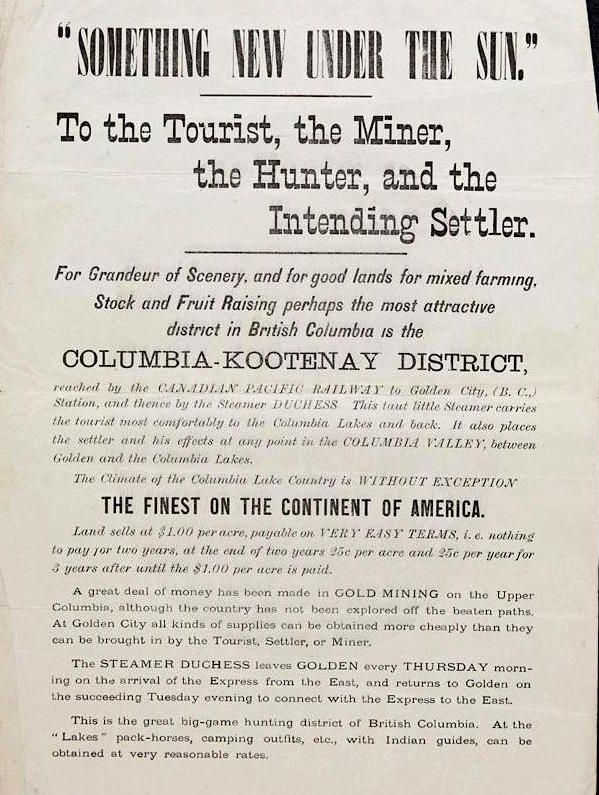
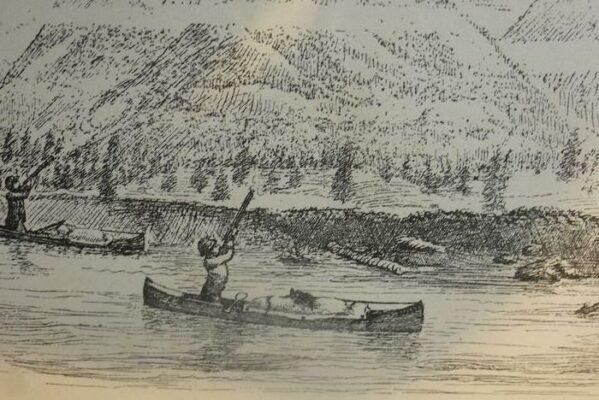
This is only things which are absolutely necessary for looking after the farm and cooking. I think a man by himself could live (i.e. eat, smoke and wash) not drink (barring tea) and no luxuries such as beef in summer or tinned meats or fruits, for $150 a year. That would also include shooting and fishing because he would not want bacon if he had game; we live on bacon. I wonder who on earth has all the ham of the bacon we eat, as we live on it in summer. Then any balance I have over would go for stocking the ranch and seeds. I forgot $50 for dress, boots, etc. I intend getting the plough as early as possible next spring. I shall have to go to Missoula for that (I have reckoned the duty and cost of packing it in, in the $30) and break up about two acres, which I shall plant with oats, so as to have something for the horses in the coming winter. Of course it will be a poor crop, but it will be better than letting the land lie idle all the year. All the summer I should be at fencing in. The total expenses will be
1. $82 for land and recording
2. $410 for farm and cooking
3. $150 to live on
4. $50 for dress
The expenses for the first year are very considerable but I have put down nothing which is not absolutely necessary and I think the prices are pretty correct, having got my information from P. and others. What I wish to do is to pay for the farm and cooking items myself. I am sure the money will be better and as safely invested as the bank would do. I think you said when I first thought of coming out here that you would allow me the same as you were paying Grasset: £100. If you will be so kind as to do that it will leave a nice little balance to start some stock on after paying items one, three, and four. I cannot expect to make much for the first two or three years, but supposing I wanted to, I could sell my claim to the ranche for a considerable amount any time. Write and let me know what you think of all this as soon as possible because two or six days at home may make the difference of a month here, as the fortnightly mail does not begin until April.
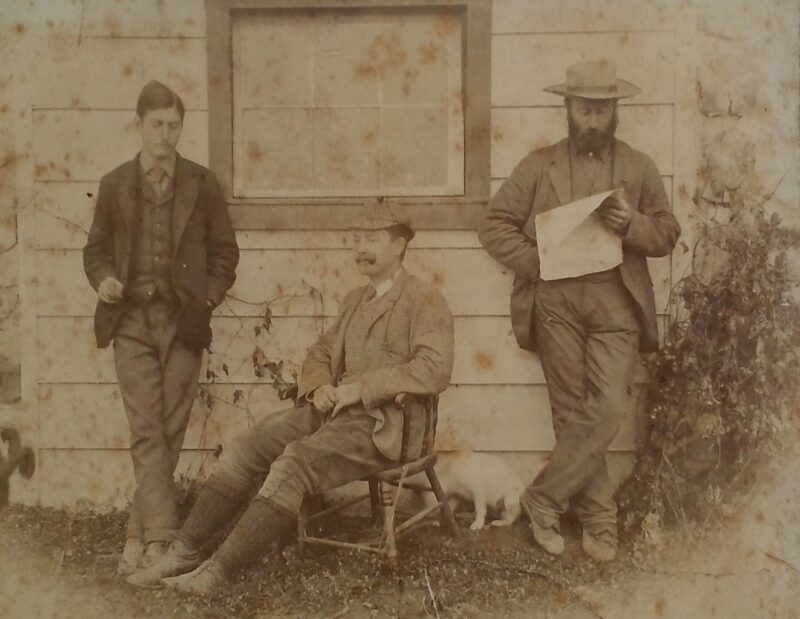
Wednesday Nov 16th. On reading this over I think I had better make the sundries $50 as little things I shall want keep cropping up. After this some news you may like.
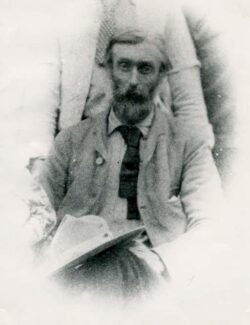
I suppose you are all rather anxious to learn about the Mrs. and family here. I call her the Mrs. although P. has never told me that they are married. I first heard about it on the steamer coming up the Columbia, when a man asked me where I was going and I told him to Mr. P’s. He said it was a pity he married a squaw. Of course, I said yes it was, but at the same time I was a good bit taken aback. But about the funniest part of the whole thing was that I thought P. would tell me that he was married directly, but no. I stayed as you know about three weeks at Kootenay with him, and he always talked as if there was no one here At last we made a start for Tobacco Plains. I thought at any rate he will tell me now, but he never said a word about her and never has yet. When we came into the house, she was sitting down and the only introduction I had from P. was, “Here’s the woman,” and that’s all I know about it. I believe they are legally married. She is not bad looking, but rather fat now, and dresses in a sort of cotton pock and a turban, very clean and well mannered and makes a capital wife, working well in the garden and the house. She is of the Royal family, being the daughter of a Chief. None of them can speak a single syllable of English. The family consists of William, age twenty, a great hunter, Nelly, nineteen, very nice looking but frightfully shy of a white man. I have only seen her about twice, Vigo — Indian name, Semo — great fisher and trapper, Enisi meaning horsefly — a capital little chap, not a bit shy. (he is the father’s favourite and always goes with us to shoot), Chamna (Beans) thirteen, also a nice boy, then John, ten, Margaret, then another girl whose name I forget, then baby girl (nine months). They all dress like white men but have long black hair behind and they are only a very little darker in colour. I am most decidedly pleased.
Being in another house I can see as much or as little of them as I like. P and I always have our meals first. The others after in turns. There are so many that there is not room for all to eat at once. I have made my house very comfortable, a good home-made bed and plenty of blankets. John Campbell is staying here at present. He is making a milk house for P. He wants me to write for a pair of spectacles for him and I think if I give you a description of the way he sees and does not see you might be able to get him a good pair from some big London man. He will give as much as £5 but I think you can get a good pair for 7s.6p. in a metal case. Sight as follows: Can see anything very plainly a long way off, and can see to read in the daytime, but cannot at night unless it is big print and then he has to hold it at arm’s length. Age about fifty. And will you send me a small and very simple recipe book, that I may manufacture a little variation in my cooking. Also a good recipe to cure bacon/ham.
We killed a yearling steer about three weeks ago, so have lived well latterly, but my belt has decreased three holes since arriving at Kootenay. At this rate my waist will be reduced to a minimum is about a year. I have been up the mountains two or four times after bear and deer but have got no nearer than the tracks of a bear, and the whistling (a most uncouth noise the deer make at this time of year) of a deer. We slaughtered nine young roosters (in this country they are called roosters, not cocks) last night, which P. is going to take up to Kootenay tomorrow. They fetch $1.25 each up there. I shall send this with him, although it won’t go from there for some time. Campbell has given me a puppy, a collie sort of greyhound. It is fawn in colour, only three days old at present and ought to be a good dog. The boys often come out shooting with me and we get on capitally. I manage to make them understand anything I want with the aid of my dictionary and signs. The Mrs. and all the fam. except Enisi have gone for a three-week hunt, so I shall be alone with him till P. returns and that may be a fortnight.
Best love to all,
Your loving son,
Tommy
Tobacco Plains
*
Dec 6, 87.
Kootenay.
My dearest Mother,
Now comes your well-earned turn. After this I shall drop turns as you are the only one who has written to me at all. I got your two letters dated Oct 12th and 19th, three Berrows and two Pinkuns for which I thank you and dad very much, also the compass which arrived quite safely, also the collars. I am very glad you sent them off before getting my letter telling you not to send them, as they are just what I wanted. You would hardly believe how much warmer a tie keeps one, besides adding greatly to look a little respectable, which I can hardly say I did with no tie or collar and about a week’s growth of beard. I shave every Sunday as a rule, but sometimes go a bit longer. I tried starting a beard but did not fancy myself at all, so dropped it.
We had a short spell of pretty cold weather about a week ago, being about 20 degrees below zero, but it was not in the least disagreeable. You catch hold of an axe or something and rush off to a tree and set to cutting it down for firewood, and soon get warm. You can’t get warm by the fire. While one side of your body is roasting the other side is freezing. Since the cold weather we have had about four inches of snow and have been having a great time sleighing around. My last letter I thought would leave Kootenay about Dec. 1st., left Nov. 15th. We got one more mail than we expected, so I won’t know when this will leave. P. is going up sometime this week, or early next, so it will be ready when he does go.
When he went last time I was left by myself, with the exception of Campbell who is still at work at the milk house he is putting up. The family and Mrs. had all gone hunting. I had to do all my own cooking. I made up my mind I would eat whatever I cooked, but I was extremely sorry I had made that resolve on my first attempt at baking. Good old shoe leather couldn’t have been tougher! But I eat it by degrees. I felt none the worse. I can manage yeast powder bread well, but I don’t understand sour-dough, which is what is used here for making the bread rise. I understand how to work it now, but it wants a lot of looking after in cold weather. I got on with the cooking part all right and made some very good dishes. I made some good hashes but had not much to experiment on. Pan cakes or flap jacks as they are called here, are a great dish here.
I have been up the mountains several times lately, but have not managed to get a deer yet. They are still far back in the mountains and will not come out until the snow sets deeper. I trapped a Canada Lynx, a very good specimen, with beautiful fur. You will see a picture of it in Woods Nat. History. The skin is worth about $2.
I forgot to tell you in my last letter so asked P. to write it on the envelope, that Barneby never came here and has gone to China, home either by India or Australia. I don’t suppose Lucas and Greathed went too.
They have made a great discovery of coal about twenty-five miles from here. I believe there are about thirty seams and one of them is eighteen feet thick. Most of it is of the very best quality, being anthracite. The analysts say it is the best coal on the American continent. It has been taken up by a company of which Col. Baker is the head boss. They are now perfectly certain to make a railway from Fort Macleod on the east of the Rockies down Elk River (which you will see marked in that little sketch I sent you) and where the coal is, almost thirty miles from the south of the Elk River down to Walla Walla in the Washington Territory. The railway will be (I feel quite certain) about fifteen miles from my ranch. Just near enough and not too near. I hope they won’t begin it before I am ready to supply them with beef and pork. They have also discovered some very rich silver quartz down in lower Kootenay, yielding as much as $1500 to the ton. So, everybody is beginning to look up a bit.
I should like a copy of Billy’s business letter. I like the idea very much if he has changed his ways a bit, I mean if he has got a little fonder of work than he was of old. The learning farming part is quite unnecessary, although I find it useful sometimes. But it is not worth the money. I wish I had learned to do more with an axe. Besides being used for its ordinary purpose it has to do duty for a saw, hammer, screw driver, plane, or anything else. I think I shall want a companion of some sort before next winter, but don’t think I shall resort to the darkie lady! P. will be my nearest neighbour seven miles off. I have made myself a hammock arm chair, but have not got the canvass yet. The eldest boy, Will, got seven deer when he was out hunting with the Mrs. and family. They were camped at my ranch, which sounds good for sport. He got another the day before yesterday far back in the mountains.
I do not get on very well with moccasins as yet. I can go on the flat and up hill, but having no heel I find it impossible to walk downhill, so I have to slide on my seat. On arriving at the bottom, the seat of my trousers and my own seat are pretty well worn out. Luckily the trousers are old, but I still have painful recollections. I have a new dodge now of fixing a piece of cord around the heel which prevents slipping a bit. They are capital moccasins made out of moose skin. The Mrs., or wife, made them for me.
You seem very afraid I don’t get enough to eat. I get enough, but I won’t say that I couldn’t do with some more. We have two meals a day, at 8:00 and 5:00, and in the summer sometimes a bit of bread and a cup of tea in the middle of the day. The days are so short now that the cook would be cooking all day if you had a mid-day meal.
Xmas day is a great day among the Indians. P. asked all the old men to dinner. They starve themselves for about a week beforehand to get fit. The Indians are no believers in work. You may perhaps come across a man who will work for two days but never longer. They make their wives do whatever there is to do, hauling wood, putting up tents, while they sit down either gambling or looking on. They are all spoilt by gambling. Nobody stops them on the American side. They will gamble off half a dozen horses and all their blankets at a sitting, and then live, till they have raised some money somehow, on begging from the white man. The only time you can get a man to work is when he has lost everything.
P. and I have been putting up a new stable and erecting a saw pit, and we are going to start in whip-sawing. He is going up to Kootenay tomorrow (10th) and will take this. I wish Kitty many happy returns of the day for yesterday. Coni has never written to me yet to tell me about the partridge shooting, which is not right after I did the keepering for him.
With best love to all,
Your most loving son,
Tommy
*
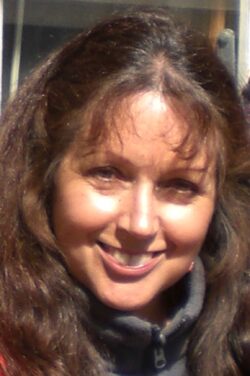
Brenda Callaghan, 1951-2018. Brenda Callaghan was born in Barrow-in-Furness, a small industrial town in the English county of Cumbia, in 1951. In defiance of local convention, Brenda remained in high school to earn A-levels and subsequently entered teacher training college, at what is now Leeds Beckett University, in 1969. Brenda’s teaching skills allowed her to immigrate to Canada in 1975 and eventually to fill teaching posts in Prince Rupert and Kitimat. Shortly after her daughter Natasha’s birth, Brenda’s first husband fell ill and left Brenda widowed in 1981. Brenda returned to academic studies in 1984 and over the following years was awarded a BA (Hons), an MA, and a PhD from the University of Victoria’s Department of History. Strongly affected by the loss of Natasha’s father, Brenda’s graduate and post-graduate research explored the cultural significance of customs associated with birth, death, and marriage in England’s post-industrial north. It was while conducting this research that Brenda met her second husband, Tim Gould, in Cumbria in 1991. During and following the completion of her PhD in 2000, Brenda worked as a sessional instructor at UVic and England’s Open University. In Cumbria, Brenda’s research was of broad public appeal and in the 1990s she established a reputation as an engaging guest speaker at local history societies. After settling with Tim in the East Kootenay region of BC in 2002, Brenda followed her interest in local history to the nearby Fort Steele Museum and Archives. It was there that Brenda, with the help of the curatorial staff, unearthed the letters of Frederick Paget Norbury. Brenda was no stuffy academic. Widely travelled, she saw much of Europe, North America, and the South Pacific. She ran a successful Bed & Breakfast in the Canadian Rockies, enjoyed live music and the theatre, was a scuba diver, keen hiker, and skier, and to the surprise of many, an enthusiastic long distance wilderness paddler.
*
The Ormsby Review. More Books. More Reviews. More Often.
Publisher and Editor: Richard Mackie
The Ormsby Review is a journal service for in-depth coverage of B.C. books and authors. The Advisory Board consists of Jean Barman, Wade Davis, Robin Fisher, Cole Harris, Hugh Johnston, Kathy Mezei, Patricia Roy, Maria Tippett, and Graeme Wynn. Scholarly Patron: SFU Graduate Liberal Studies. Honorary Patron: Yosef Wosk. Provincial Government Patron since September 2018: Creative BC
“Only connect.” – E.M. Forster
2 comments on “1244 Golden City to Tobacco Plains”
Dear Sir/Madam,
I recently stumbled upon this online story of Tommy Norbury’s amazing life and his contribution to the early development of the Columbia/Kootenay Valley during the 1888s and 1890s, and find it fascinating. I grew up in the Tobacco Plains area and am quite familiar with many of the names and places mentioned in Branda Callaghan’s wonderful historical account.
I have read the first three chapters that were posted online by The Ormsby Review Press in 2021 and am wondering if subsequent chapters of the story are continued, to be found elsewhere, or if not, will they be published at some future time? I’ve brought this series to the attention of family and friends who live in that area and they are equally fascinated by the early history of their community, and have asked if the story continues beyond the third chapter.
Any information you can offer on the continuation (or possible future continuation) of this story would be very much appreciated. Cheers, and thank you, Ron Holmes
Hi Ron, Thank you very much for your comment. I’m delighted that you found Brenda Callaghan’s life of Tommy Norbury fascinating and that you’ve shared the links with your family and friends. To answer your question, yes, I have the subsequent chapters and have every intention of publishing them. I seem to get busier by the day! But your response is a spur to my inactivity and I will try to continue with Brenda Callaghan’s Frederick Paget Norbury, Remittance Man or Gentleman Immigrant: The Story of an Englishman in Canada. Very best, Richard Mackie
Richard Somerset Mackie, publisher and editor
The British Columbia Review: https://thebcreview.ca/
Please subscribe: https://thebcreview.ca/subscribe/
Please donate: https://thebcreview.ca/donate/
Follow us on Facebook: https://www.facebook.com/TheBCReview/
Follow us on Twitter: https://twitter.com/booksinbcv
Follow us on Instagram: https://www.instagram.com/thebcreview/
We acknowledge the generous support of grants from Creative BC and the Department of Canadian Heritage Aid to Publishers